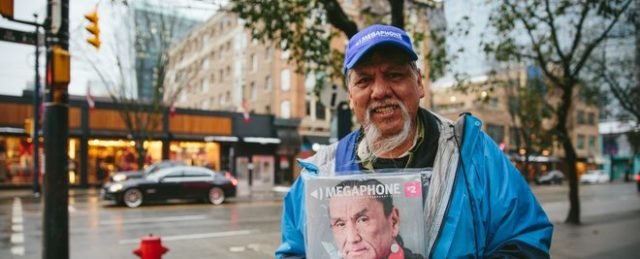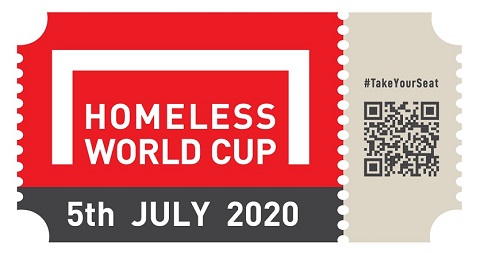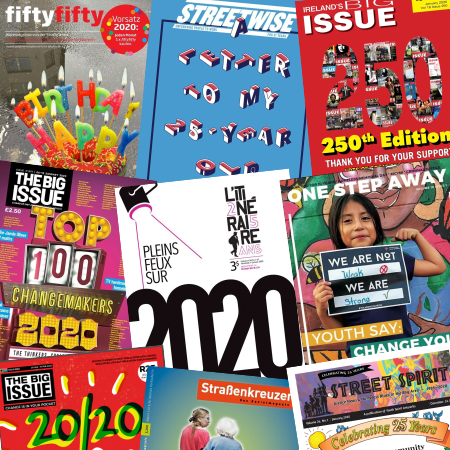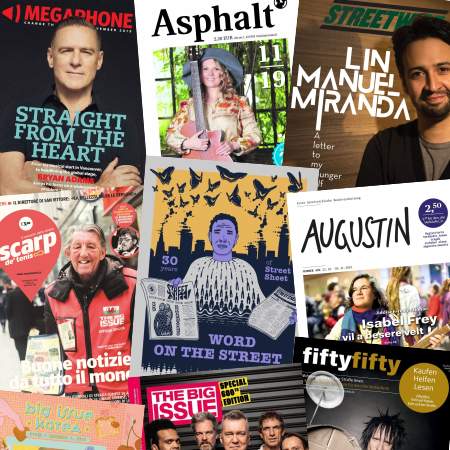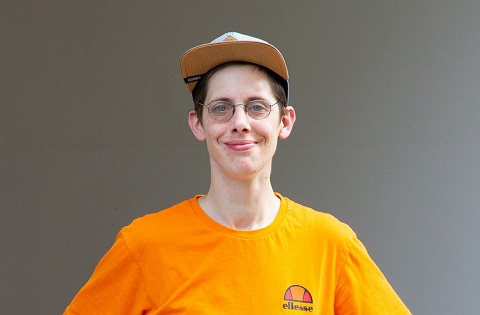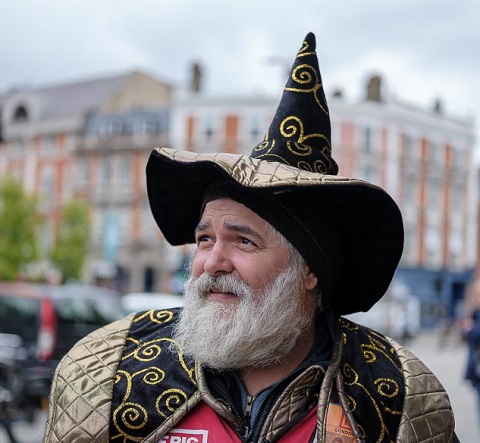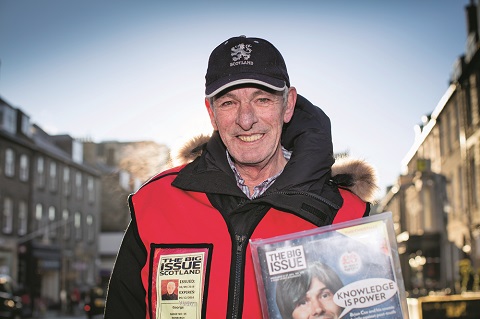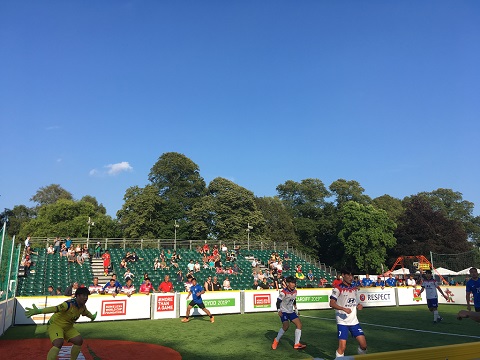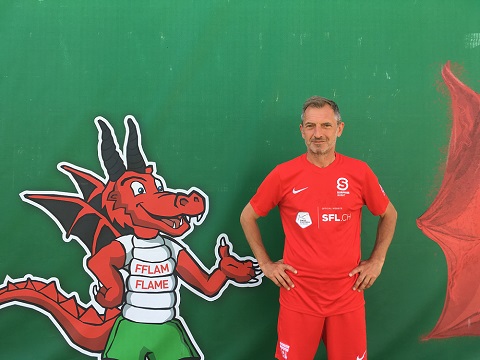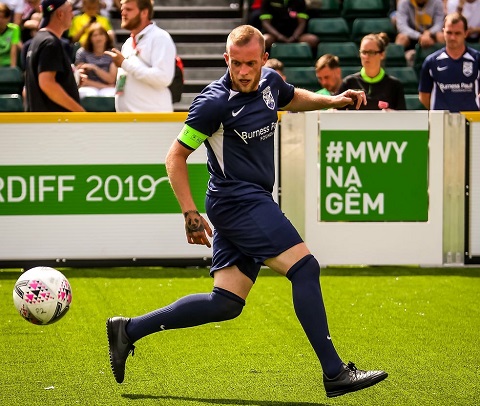By Michael Sheen, The Big Issue (UK)
I’d never seen anything like the joy on the face of the woman not 50 feet in front of me wearing the red jersey and spinning like the happiest top in the world. Her name was Dee. She’d just scored her first ever goal. Anywhere. Ever. And she’d scored it for her country – Wales. An hour earlier she’d been telling me what it was like to come out of prison and live on the streets for four years addicted to heroin. Now, she was looking forward to getting home and having the chance to see her children for the first time in months. It doesn’t matter if you’re Gareth Bale or Dee Sansome, pulling on that jersey to represent your country – that changes you. And that’s what the Homeless World Cup is all about: the chance for change.
When I was first asked to become patron of Street Football Wales, I’ll be honest with you, I didn’t get it. Why spend money and time on football for homeless people when surely it would be better spent dealing with the homelessness itself? When I saw how people were drawn to the football, people whom it would be almost impossible to connect with otherwise, I began to see the possibilities of what was happening there. People who had been isolated and excluded for years were making friends, finding some long-lost self-confidence, motivation to change, some dignity and pride instead of judgment and stigma. I saw that this approach could be transformational.
![Michael Sheen [Courtesy of the Homeless World Cup]](https://hub.insp.ngo/wp-content/uploads/2019/07/TBI_Michael-Sheen-on-HWC_3.jpg)
A wonderful man called Keri Harris has brought hundreds of people through this process since he founded Street Football Wales in 2003, and 16 years on, 30 teams of men and women who’ve experienced homelessness are regularly playing football across Wales. He has taken a Wales side to every Homeless World Cup since the first tournament in Graz, Austria.
And it was with Keri, and the Welsh men’s and women’s teams, that I went to Oslo for my first tournament in 2017.
I’ve played in football games in some of the most overwhelming refugee camps in the world. I took part in a match in a Bangladesh camp with the young, persecuted men of Rohingya where there were hundreds watching and cheering and, at times, even more than that number actually playing.
I’ve stood with soldiers as young as eight or nine in Chad as they told me about the horrors they’d seen and even taken part in. We struggled to understand each other but when the football came out, no words were needed. We laughed and played together on a piece of scorched wasteland until it was too dark to see each other’s smiling face any longer.
I’ve had one of the most uproarious games I’ve ever taken part in with about 25 young girls in Guatemala in an alleyway that two adults would struggle to walk down next to each other. In one of the most dangerous countries in the world for a child to grow up in, they ran up and down that alleyway chasing the deflated ball with an abandon and a fearlessness that was exhilarating to be swept up in.
What a fantastic Day 2 of #Cardiff2019HWC! Full of wonderful moments – football, debate, comedy & music all bringing people together in the Welsh sunshine! #MoreThanAGame https://t.co/NxjM83kerR
— michael sheen 💙 (@michaelsheen) July 28, 2019
But I’ve never experienced anything that has stayed with me like Dee scoring that goal at the Homeless World Cup in Oslo two years ago. It changed her – and it changed me.
I swore then that I would do everything I could to bring the event to the UK and to Wales – my homeland.
I became part of the successful bid to bring it to Cardiff and have been working on shaping the event ever since. It’s the most fantastic opportunity, not only to host a spectacular tournament of football and showcase the very best of what Cardiff and Wales has to offer for the 500 players coming from nearly 50 different countries, but most importantly, to make the most of the platform it provides to create real change around homelessness and social exclusion as a legacy afterwards.
So I’ve spent time visiting the emergency accommodation premises in Cardiff. I’ve talked to the city council homelessness team. I’ve talked to doctors, receptionists, politicians, support workers and the biggest experts of all, the people experiencing the day-to-day reality of homelessness themselves. The focus that this tournament is bringing has the potential for all these people to collaborate in a way that has never happened before.
Out of this engagement we are formulating requests for legislators, ideas for collaborative initiatives between different stakeholders within the sector, requests for funding to be used in new and innovative ways around these issues, and for the voices of those at the sharp end of it to be at the heart of it all.
![Michael Sheen with Big Issue vendors. [Courtesy of The Big Issue (UK)]](https://hub.insp.ngo/wp-content/uploads/2019/07/TBI_Michael-Sheen-on-HWC_1.jpg)
I’m working with Katie Dalton, the director of Cymorth Cymru, the umbrella body for providers of homelessness, housing-related support and social care services in Wales, to listen to the experience of their members and the people they work to support and let them take the lead in formulating ideas for real change.
Central to our plans for the tournament itself are the engagement of 200 adults experiencing homelessness from across Wales as staff and volunteers, creating tailored opportunities that support them into long-term, stable employment.
The Homeless World Cup is about much more than football. There’s music from some of the best artists in Wales and debate that will really help people engage with the issues.
This tournament will change lives. I truly believe the Homeless World Cup can be the catalyst for that transformation.
Originally published in The Big Issue (UK)







